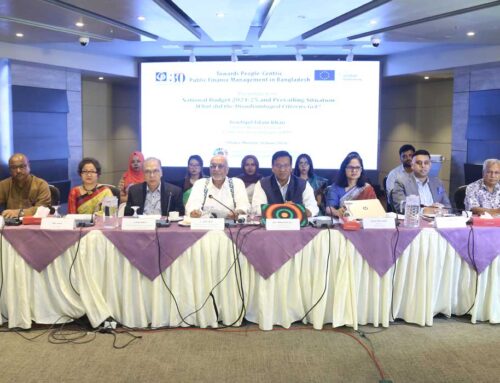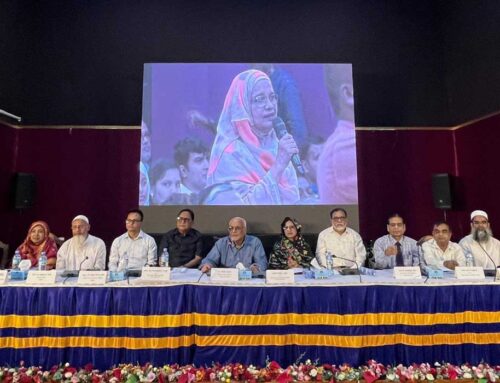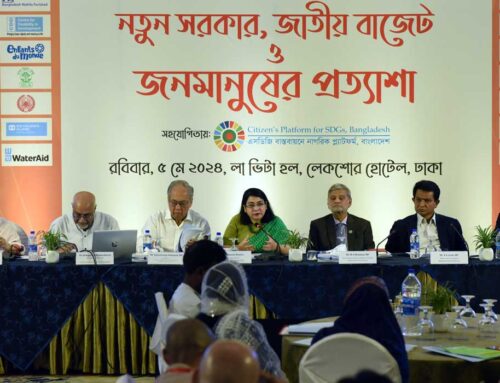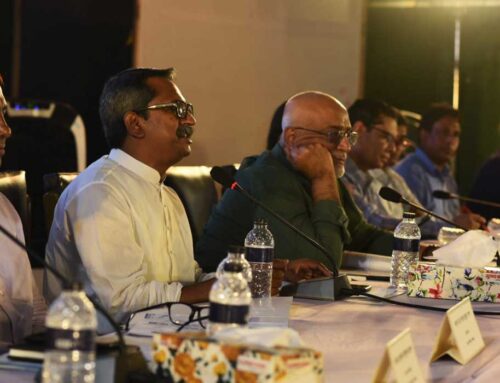Overall benefits of farmers in Bangladesh are not seen as much as the development of the agriculture sector. Ensuring the survival of small and marginal farmers has become a challenge. Despite bumper yield, the price of paddy increases every year, and farmers do not get their fair share of the profit. Moreover, errors in production estimates are adding further to the problem. Farmers from nine different districts stated that, they do not have enough facilities to stock their produces. A huge number of farmers don’t even get a chance to sell their produces’ to the government due to lottery selection process. It forces them to sell the paddy to the millers’ at a comparatively low price right after harvesting.
On the other hand, a higher rice price should not become a burden on the consumers belonging to the middle-income group. According to millers, a reduction in the import duty was not effective enough as the decision came quite late. Creating an ‘Agricultural Commodity Prices Commission’ along with the farmers as well as the respective policy makers will make sure the proper pricing of the produces and would give the market a signal to get the right idea about the numbers, estimations and various situations.
These remarks and observations came up in a virtual dialogue titled “Why there is a rise in the pricing of rice? Whose profit, whose loss?” organised by the Citizen’s Platform for SDGs, Bangladesh on Sunday, 10th January 2021.
The session was chaired by Dr Debapriya Bhattacharya, Convenor, Citizen’s Platform and Distinguished Fellow, Centre for Policy Dialogue (CPD). Referring to the need for accurate estimates of rice production in Bangladesh, he said policymakers make decisions based on these estimations. Data about the production was confusing and it affected the market. The Government does not have the opportunity to influence the market due to low storage capacity.
Around forty farmers and people related to agricultural business from nine districts (Gaibandha, Pirojpur, Satkhira, Sunamganj, Meherpur, Nilphamari, Rangpur, Sirajganj & Kurigram) in northern, southern and Haor regions of Bangladesh joined this virtual dialogue and highlighted their statements. They said that the mill owners stockpile paddy in advance, so farmers do not get their actual price even if the price of rice goes up. Farmers now-a-days are moving away from rice cultivation and shifting towards vegetables or horticultural crop cultivation which seems more beneficial to them.
Mr Mohd. Emaz Uddin Pramanik, MP, Member, Parliamentary Standing Committee on Ministry of Agriculture was present at the dialogue as Special Guest. He highlighted the various subsidies and initiatives of the current government in the agricultural sector and mentioned that the government was paying special attention to extend all these benefits to the farmers.
Dr M Asaduzzaman, Former Research Director, Bangladesh Institute of Development Studies (BIDS) and Mr Shykh Seraj, Director and Head of News, Channel I made the kick-off remarks. Mr Asaduzzaman said, a decrease in production, if not, stocking by the middle man causes problem in the entire supply chain. Bringing the millers into a legal atmosphere will also lessen the problem by creating a balance with the farmers. Pricing of pre-boro for atleast five months is very important. Mr Seraj also added with him at this point. Production of Aman in the past year was less than the estimated amount. Government has a stock of around five lac ton which should have been atleast fifteen lac ton. Overall production of rice is decreasing. Farmers are losing their interest, mostly of the Barind region due to having very low selling price and high production cost. Recently Bangladesh gave permission to 29 organizations to import rice from India. In the past years, the number of institutes to import rice was limited which is very open now. Mr Seraj also appreciated the fact that export-import duty rate is decreased to 25% which was 62% before this.
Dr Quazi Shahabuddin, Former Director General, Bangladesh Institute of Development Studies (BIDS) as another kick-off speaker showed concern about the increase of the pricing and unless there is a disaster, pricing should not increases as the production was high according to the officials. Farmers sell their paddy but they are not benefitted, whereas millers convert the paddy into rice and enjoys the profit. He also raised question regarding this matter whether the benefitted group are the reason to increase the price and also if the food ministry is taking necessary steps to dealing with the food crisis.
President of Krishok Samity, Mr Sajjad Zahir Chandan, and various farmers from nine different districts stated, this crisis is for government’s policy. Mr Chandan suggested to set up temporary government procurement centre in every union rather than in Upazilla/District level. It would help the government to reach more farmers. Government is buying rice from millers instead of real farmers, so farmers are not benefitting. Highlighting the shortage of rice in the market due to stocks of millers and seasonal traders, he said there was no reason to increase rice price even after the bumper harvest every year. On the other hand, Mr AKM Khorshed Alam Khan, President, Bangladesh Auto Rice Mill Owners’ Association denied the data of having adequate amount of production in the stock. Millers are buying from farmers with a rate of BDT 1050 said Mr Khan and stated that the mills’ operational costs are increasing. Mr Md Shah Alam Babu, President, Bangladesh Rice Exporters Association said, although the import duty on rice has been reduced, this amount of rice could not be imported due to the late implication of the policy.
Dr Md Nazirul Islam, Director General, Bangladesh Agricultural Research Institute (BARI) and Dr Md. Shahjahan Kabir, Director General, Bangladesh Rice Research Institute (BRRI) both showed their concern regarding the rise in price in the upcoming Ramadan Season. Though Dr Islam recommended about increasing cropping intensity and to reduce the pressure in rice cultivation, Dr Kabir stated that history says in last 5-7 years, farmers may have destroyed rice or produced less but the price never increased. Dr Mirza Mofazzol Islam, Director General, Bangladesh Institute of Nuclear Agriculture (BINA) said, closing of husking mills are reason for high price in rice. He suggested of introducing the tolerant varieties of rice more in the cultivation, strengthen the market management and determine the price of rice to create a proper balance.
Public representatives, government officials, representatives from research institutes on agriculture, rice traders, and rice mill owners participated in the dialogue and expressed their views and statements.






